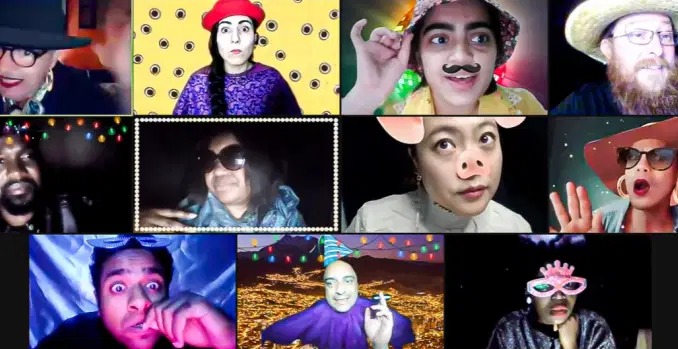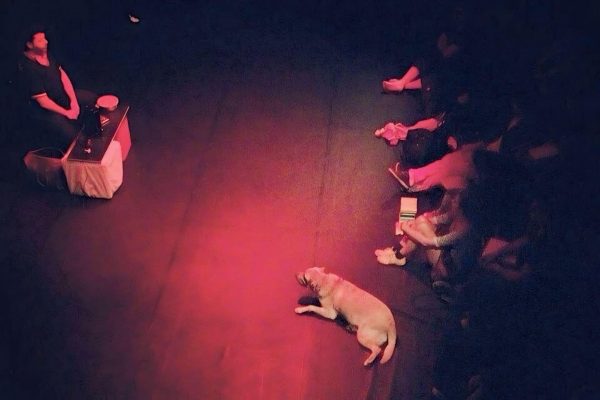The past year and half has felt like eternity, literally. The pandemic has not only fractured the world as we knew it, it has also doused it in despair. So far it has cost millions of lives and billions of dollars worth of economic losses worldwide, and counting.
While it is safe to conclude that the worst of it is now behind us, the delta variant notwithstanding, the same cannot be said of the fictional and futuristic world we encounter in The Art of Facing Fear (The World United) – a digital play written by Ivam Cabral and Rodolfo Garcia Valquez, who is also directs the play. It is produced by Red Curtain International and features 25 actors from five continents.
In that world, the people have been through 5555 days of trauma, forced seclusion and death, also supposedly arising from a strange affliction. When we first meet some of the survivors, they are visibly shaken and strained, and nothing in their world is what it used to be: the schools and streets are empty, but hospitals are full with the dead and dying; a system breakdown has cut off all forms of communication.
There is no social life and neither are there elections, which one could argue confers a semblance of normalcy, since they happen in four-, five- or six-year cycles — all things being equal.
When in despair, look up to the skars
“I went down into darkness, into despair and nothing could take me out of it,” one of them cried, alone in her room, bringing memories of how our own world felt this time a year ago, at the height of the pandemic (the play started screening in June to a global audience). “Then I started looking for small hopes. In this darkness, I learned to look at the stars.”
According to the World Health Organisataion (WHO), as of the second week of June 2020, the disease had caused 110,000 fatalities with the United States being the country struggling to cope with nearly two million reported cases. Mexico was a distant second.
So what does a race brought its knees by a yet-to-be-determined disease to do? Tap into any and every available strand of hope or support system. “Then I started looking for small hopes,” one of characters said. “In this darkness, I learned to look at the stars.”
A re-assuring voice, perhaps: as it happens, the individuals find that they can still reach out to friends in distant locations but through a screen (read smart phone).
Faced with their helplessness, the individuals look beyond their predicaments and take a moment to laugh at their old materialistic selves, at their new normal. All the worldly pleasures and possessions that seemed to be the measure of comfort and social standing have been stripped away.
“I had a job, a career, a family and a fucking big TV,” one said, reflecting on his pre-pandemic life, which was also made meaningful by a washing machine and a Japanese car. “I am happy because I have nothing – just this body and this head.”
The joy of having nothing
“I had everything those TV commercials offered,” another chipped into the conversation.
With no bills to worry about, a non-existent economy and no career to revel in, the group seemed pretty content with their new status.
In my part of the word (Nigeria), there is a popular saying, often targeted at materialistic folks, that goes like this: “We came to the world with nothing and we will leave it with nothing.”
Beyond mirroring what the pandemic has done to our world and this generation, the Art of Facing Fear probes what it feels like to be human in very tense and uncertain circumstances. From our respective corners of the world, we get a ring-side view of private conversations and concerns, some between friends.
As the audience we also get a role, by way of comments in the chat window about our own fears, which the actors read out to everyone’s hearing.
“I’m afraid there’ll be another pandemic,” one of the hundreds who watched the show when I did typed in the chat-box.
“I’m afraid things won’t be the same as before,” another said.
And yet another: “I’m afraid of dying alone.”
I guess with this exercise, the producers wanted to make the point that fear – like love and hate — is universal. And this should not surprise anyone, really.
The world as one
The Art of Facing Fear celebrates global culture and diversity like I have not seen it done before in a theatrical production, or any creative offering for that matter. I suppose one should expect that in a project that has participation from at least 25 countries.
I was pleased to hear the actors speak in their own local-cum-national languages and accents, though most of the dialogue is in English; we didn’t need translators – we could feel the emotion and message behind every syllable and every word uttered.
And the play couldn’t help making political commentary. If anything, the second half of it was cathartic, helping to give vent to all shades of private pains and arguments shared by millions of everyday people around the world. From Iran and Indonesia to Bolivia and Brazil, the stories are as human-interest as can be.
In one instance, a voice speaking for a minority group protests (in hiding) against the total submission demanded by a Supreme Leader; in another, there is a passing reference to “orange man Trump” who repeatedly labeled Covid-19 the Kung-Fu/ China virus, the Indonesian actor holding a taser as she rebukes the former president and his many missteps.
And there was the Venezuelan, an economic migrant, who is displeased and disappointed by the political dynamics in his country. He is fed up with “thousands of promises” made by the ruling elite since he was a boy that ended up as just that – empty promises. Decades on, all there is to show is death, poverty and repression.
“Memories…that’s what’s left of a life I was forced to abandon,” he said. “So many years of struggle, just to run away from my own home.”
And it’s no surprise that dialogue around the Covid-19 vaccine, which is currently at the heart of global news cycles, is written into the play. While the Cape Verdian actor supposedly holidaying in the United States is assured of getting his jabs while in forced quarantine, Indians on the other hand can’t be that sure, though the country has suffered severely from the virus — there’s been 30m reported cases and nearly 400,000 deaths.
“In India, we can’t even get a slot on the queue for vaccination,” the actor says, horrified.
So what’s a world ravaged by a pandemic and tortured by fear do? For answers, we turn to celebrated Nigerian thespian Segun Adefila. “The pandemic shall be swept away,” he assures in the guttural and all-knowing voice of his character (a masquerade) with a caveat. “But my warnings you must heed.”
Words of hope
But beyond the pockets of despair that runs through the play, there were occasional sparks of hope. Whether it is the South Korean encouraging us to rejoice while we are all alive or the lines of the poem by Brazilian Cecilia Morales that says that however bad things are or may be, Spring will surely come.
Rehearsals for the production lasted at least four weeks. “This particular one was a bit hard, because this time around the time zones were really crazy. Sometimes we rehearsed at 2am or 3am (WAT) just so it can accommodate everyone,” Omobola Stephen-Atitebi, the other Nigerian actor on the project, told me in an interview after the second weekend of the play’s screening. “That was a big challenge for everyone really, because some of of have to go to work and others have other issues to deal with in their countries of residence. It was quite a struggle.”
Stephen-Atitebi and Adefila were in an earlier version of the play, which screened in July 2020 and which I also had the pleasure of seeing — and reviewing. For this production, however, she delivered one of the hair-raising moments of the play – reciting lines from the poem Still, I Rise by Maya Angelou.
I asked how she felt speaking those epic words of defiance and self-assurance by the late poet, especially as she didn’t know about it previously.
“I felt powerful,” she said pausing for a moment to think her response through. “I felt like I was the mouthpiece of a race. I also felt like I know who I am and so I am declaring it. I felt like I have come to a knowledge of myself and I speak in that knowledge. And that’s a powerful place to be, to know who you are and what you’re here for.”
This play deserves to be seen by everyone, whether you believe in the vaccine or not, whatever the colour of your skin or your political, religious or sexual orientation. It’s a production that makes us see how little those man-made ideologies count when we face the same threat or enemy.
“I love the fact that so many people came together to create magic with a technology that we all use,” one audience member said during the post-play feedback.
Another speaker, an Indian resident in Canada, echoed those sentiments. “Technology has brought the world together, but what you (cast and crew) have done is brought cultures together,” he said.
The play screens again this weekend. Can you can face – or own up to – your fear?
Fonte: Travu




